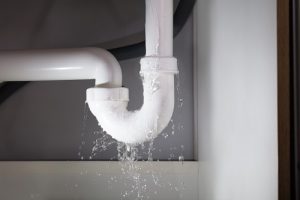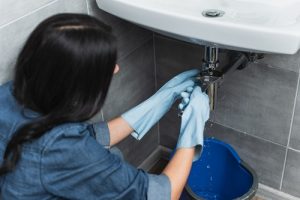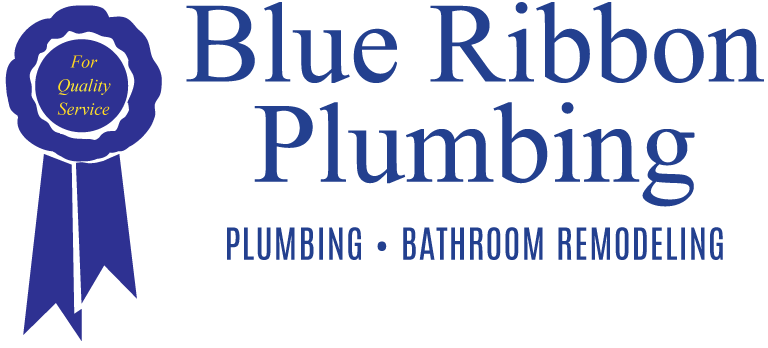 A homeowners insurance policy should cover any unexpected and sudden water damage brought on by a plumbing problem. The majority of home insurance coverage does not include home damage caused by
A homeowners insurance policy should cover any unexpected and sudden water damage brought on by a plumbing problem. The majority of home insurance coverage does not include home damage caused by
- constant and slow leaks
- damage that occurred because of flooding.
Some home damage, such as mold, could be excluded from your regular insurance policy depending on its cause. However, there are other insurance coverages that can be added to existing premiums.
Water Damage from Pipe Leaks
Your home insurance policy should cover accidental and sudden water damage caused by a plumbing failure, such as a ruptured water heater or burst pipe.
If your home has water damage, there are three clauses in the homeowners insurance policy that could provide you with coverage:
Dwelling coverage: This clause insures your home’s structure, including the floorboards, walls, and roof. If a covered leak has damaged a section of your home or you had to get rid of a part of your wall to repair a leak, your home coverage should reimburse you. Your dwelling insurance will also cover any built-in appliances in your home if they are damaged.
Property coverage: This coverage will reimburse you for
- any damaged personal property
- clothing
- furniture
- TVs
These may have been destroyed after a plumbing problem wreaks havoc in your home. However, luxury items such as jewelry will be covered, but with a $2,000 limit, unless you added extra coverage to your policy.
Additional Living Expenses (ALE) coverage: This type of coverage will reimburse you for your travel, hotel, and food expenses if you were displaced from your house temporarily.
For instance, if water begins to pour out of your washing machine while you are not at home, it may cause buckling on your wooden floorboards. Additionally, the water may leak through your floors and damage your walls or the ceiling of the floor underneath. In such a case, an insurance adjuster will assess the damage to your home.
What Plumbing Damage Cannot Be Covered by Home Insurance
Although burst pipes and plumbing malfunctions are covered under water damage, you need to know that there are some situations or types of damage that are not covered. When you file a water damage claim, your insurer will send out an insurance adjuster to evaluate the cause and cost of the damage. They will assess:
- The source of the damage or the location of the affected pipes
- Whether the damage occurred due to a new leak or an old one
- Whether there were signs of deterioration that may have indicated future leaks
- Whether the leak is the result of old age or deterioration
The insurance adjuster will use these assessments to determine if you could have prevented the leak. If they believe you could have prevented it, they will not provide you with coverage.
 Lack of Maintenance
Lack of Maintenance
Water damage resulting from normal deterioration or insufficient plumbing maintenance won’t be covered. Insurers also deny claims for burst pipes during winter, a common claim made by several homeowners.
Sewage Backup
While a leaking toilet could be covered by homeowners insurance policies, a backed-up or flooded sewage system will not be covered. Even if it could overload your plumbing system. Fortunately, many home insurance companies offer sewer or water backup insurance as a cost-effective rider that can be added to an existing policy. It’s a great idea to include this optional coverage because sewage damage can be hazardous to your family’s health and can cause costly damage to your home and property.
Flood Damage
Damage resulting from a defective pipe or utility is usually covered. Flood damage occurs when heavy rains, overflowing water bodies, or snowmelt raise water levels to the point of accessing your house and overloads the plumbing system. This damage is not included in your homeowners insurance policy, but you can purchase flood insurance coverage from your insurer if they participate in the National Flood Insurance Program (NFIP).
Mold Damage
Most homeowners insurance policies do not cover mold damage. However, insurance firms do offer varying levels of protection against mold damage if it is due to a covered leak. You must carefully read your policy to fully understand your coverage. If covered, your insurer will reimburse you for up to $10,000 for mold remediation, but the amount will depend on certain factors.
You should regularly clean, dehumidify, and ventilate areas susceptible to mold growth to prevent its spread. These areas include the crawl space, bathrooms, laundry rooms, garages, and cabinets under sinks.
If you notice a water leak, take immediate steps to prevent further damage. Stop the flow of water by shutting off your main water valve. Call an emergency plumber to help you fix the leak.
Call Blue Ribbon Plumbing LLC if you have problems with water leaks at home.
Like our Facebook page for more great info about services.
Blue Ribbon Plumbing LLC
4201 Carolina Exchange Drive Suite 202
Myrtle Beach, SC 29579
(843) 267-9733
https://www.blueribbonplumbingmb.com/
Serving all of Horry County including Myrtle Beach, North Myrtle Beach, Little River, Murrells Inlet/Garden City, Surfside Beach, Carolina Forest/Forestbrook, Conway/Aynor

